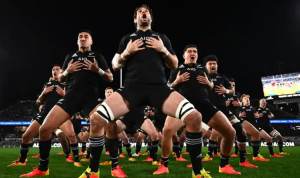Have you ever seen the New Zealand Rugby team before playing a match on the field? Yes… they perform a dance prior to each international rugby game. This is called ‘Haka’.
The Haka has long been a predominant feature in All Blacks rugby, with the team carrying on the tradition of performing the dance prior to each international game
But where did it originate, and why is it performed by New Zealand?
The Haka is a ceremonial dance in Maori culture. In popular culture, it has been associated with the traditional battle preparations of male warriors, although haka dances have historically been performed by both men and women.
Haka are performed to welcome distinguished guests, or to acknowledge great achievements, occasions or funerals.
During 1888, the New Zealand Native team toured the Home Nations of the United Kingdom. They became the first team from a colony to do so.
It was originally intended that only Māori players would be selected, but four non-Māori were finally included. As the non-Māori were born in New Zealand, the name “Native” was considered justified. The team performed a haka before the start of their first match on 3 October 1888 against Surrey.
Throughout the early 1900s, different touring new Zealand teams performed variations of the Haka as they faced up to different opposition at home and abroad.
The practice dates back hundreds of years but it was first brought to rugby by the infamous New Zealand Native football team – a group of mostly Māori players who toured Britain, Ireland, Australia and New Zealand in 1888 and 1889 – with the New Zealand national team adopting it more than a decade later in 1905.
Haka performance clubs are common in schools in New Zealand, with the Te Matatini Maori performance arts festival hosting a competition every two years.
The most recognisable haka for rugby fans is Ka Mate, which was composed by a Maori chieftain in 1820.
Its association with rugby began with its performance by the “New Zealand Natives” in 1888, and it has gone on to underpin the All Blacks’ unique identity in the sport.




